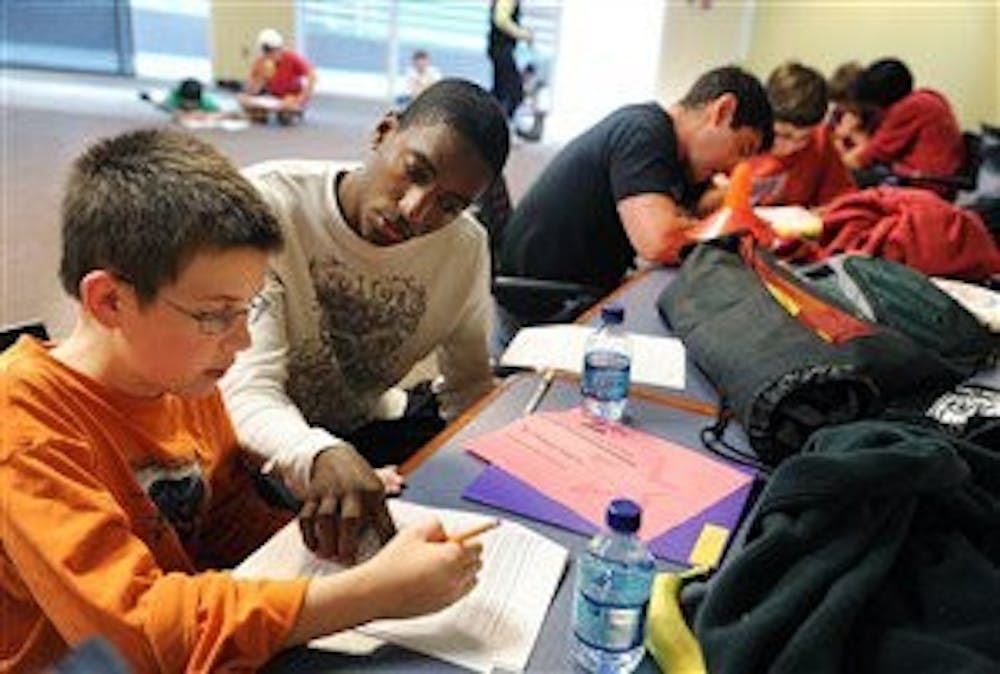Elon University seniors Brett Brawerman and Kendall Adkins have taken over a mentoring program at Elon that provides outlets for young boys to exercise in interesting ways while gaining confidence.
The Coaching Health and Mentoring Positive Students program, or C.H.A.M.P.S, is a program at Elon designed to combat childhood obesity, specifically in boys in fourth and fifth grade, through a series of sessions on hot topics for boys of that age such as peer pressure and nutrition, individual mentoring time and skill acquisition within various sports.
“It was created to expose these kids to sports and topics that they haven’t really been exposed to,” said Brawerman, head facilitator of the program. “So that when they get to middle schools and competitive sports they can feel more comfortable and at ease, so they can have a higher sense of perceived confidence.”
The program is entering its third year after T.J. Douglas, Class of 2010 and member of the varsity men’s basketball team at the time, created the program in 2010. Douglas got the idea from a program called Girls in Motion, similar in structure, focusing more on appearances for young girls and is not as sports-based, said Adkins, assistant facilitator and roommate of four years to Brawerman.
“This program really allows for (the boys) to build relationships with people that they look up to,” Adkins said. “For me, I love the one-on-one atmosphere, and as a kid growing up, I would have loved this program.”
Adkins said the two facilitators are really striving to develop the one-on-one atmosphere in their program this year. They just finished receiving applications for mentors and hope to pick 25 well-qualified students at Elon, all young men, to be mentors this spring.
Each child will have his own mentor to look up to and confide in, but will also have the chance to interact and play sports with the members of Elon’s men’s varsity sports teams, Brawerman said. In the past, the group has worked closely with the football, basketball and lacrosse teams.
“Being able to work with the varsity (players) from Elon is really great because they have a connection to feel a part of something bigger,” Brawerman said.
In addition to strengthening the connections between the athletes and the boys, Liz Bailey, lecturer in health and human performance and faculty coordinator for the program, said through the collection of data, there have been other positive impacts as well.
“In survey data we have collected since the program’s inception, we have observed a significant increase in self-esteem, some positive changes in level of physical activity and an increase in perceived competence when it comes to a variety of physical activities,” Bailey said. “In addition, the boys report really enjoying the program and the parents are very pleased with the program as well. Finally, the college guys seem to really enjoy themselves.”
Brawerman said the program especially attracts him because he wants to create some kind of sports-related mentorship and tutoring program in the village in which he is placed when he joins the Peace Corps upon graduation. C.H.A.M.P.S. has been one of his biggest motivations and inspirations while undertaking this project, he said.
“I want people to understand why we are doing this,” he said. “It’s not just to be involved in something on campus. It’s really because we want to make a difference in a boy’s life.”
Adkins and Brawerman said they believe this program is something that could benefit other college campuses as well. A manual was created, describing every aspect of the program in case other universities want to adopt the ideas and create a C.H.A.M.P.S. program of their own.
Last summer, Brawerman researched perceived confidence and childhood obesity to better his understanding before taking over the program this year. He will fly to Utah for the National Conference of Undergraduate Research and to the American College of Sports Medicine in San Francisco to present the findings. Brawerman hopes to share the manual with the people he meets to eventually make C.H.A.M.P.S. into a national program.


